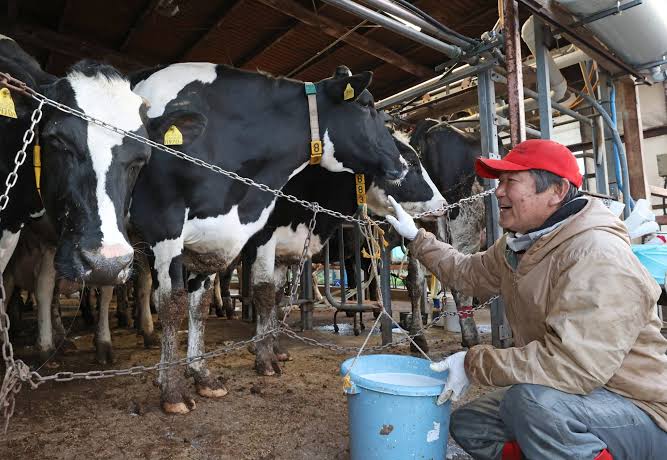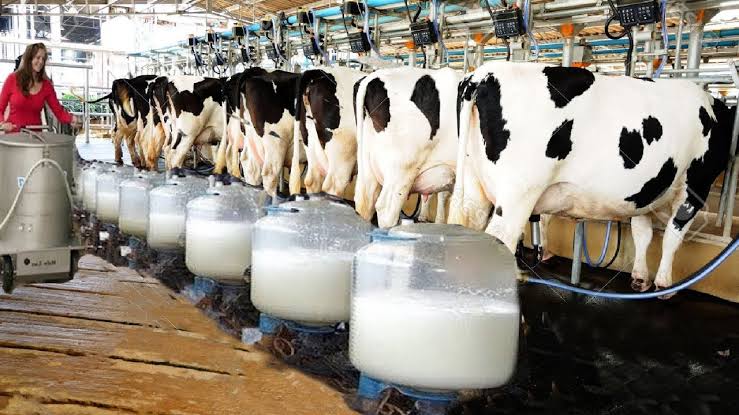Dairy farming is the practice of raising and caring for cows to produce milk and other dairy products. It plays a crucial role in providing milk, cheese, butter, and other nutritious foods to people around the world. In this farming method, farmers take care of cows from birth to adulthood, ensuring their well-being and optimizing milk production.
The process begins with selecting healthy and productive breeds of cows. Farmers consider factors such as milk yield, resistance to diseases, and adaptability to local conditions. Once the cows are chosen, they are provided with proper nutrition, including a balanced diet of grains, forages, and supplements. This careful feeding regimen is essential for maintaining the health of the cows and maximizing milk quality.
Cows, being mammals, need to give birth to produce milk. This means that dairy farmers carefully manage the reproductive cycle of their cows, ensuring proper mating and calving. After giving birth, the cows enter the milking phase, where they are milked regularly. Modern dairy farms often use milking machines to efficiently extract milk from the cows.
Maintaining a clean and hygienic environment is crucial in dairy farming. Cleanliness ensures the quality and safety of the milk produced. Farmers pay close attention to the cleanliness of milking equipment, cowsheds, and storage facilities. This helps prevent contamination and ensures that the milk meets high standards for human consumption.
Dairy farmers also prioritize the health and well-being of their cows. Regular veterinary check-ups, vaccinations, and prompt treatment of illnesses are essential components of responsible dairy farming. Happy and healthy cows not only produce better-quality milk but also contribute to the overall sustainability of the farm.
The milk obtained from dairy farming is a versatile raw material used to produce various dairy products. Cheese, butter, yogurt, and ice cream are just a few examples. Dairy processing facilities play a significant role in transforming raw milk into these consumer-friendly products. This adds value to the milk and provides consumers with a diverse range of tasty and nutritious options.
Dairy farming is not only about milk production; it also has environmental implications. Responsible dairy farmers implement sustainable practices to minimize their environmental impact. This may include efficient waste management, energy conservation, and responsible land use. Some dairy farms also explore alternative energy sources to power their operations.
The economic aspect of dairy farming is substantial. It provides livelihoods for farmers, farmworkers, and those involved in the dairy industry. Additionally, dairy farming contributes to the overall economy by generating income, creating jobs, and supporting related businesses such as feed suppliers, equipment manufacturers, and transportation services.
In addition, dairy farming is a complex and essential agricultural practice that involves caring for cows, producing high-quality milk, and contributing to the production of a variety of dairy products. Responsible and sustainable dairy farming practices not only benefit the farmers and the industry but also play a crucial role in providing nutritious food for people worldwide.
Read Also: Honey Production Guide: The Basics to Get Started
How to Carryout Dairy Farming

Dairy farming involves several key steps to ensure the health and productivity of cows and the production of high-quality milk. Here is a basic guide on how to carry out dairy farming:
1. Selecting Cattle: Choose healthy and productive breeds of cows based on factors such as milk yield, disease resistance, and adaptability to local conditions.
2. Providing Proper Nutrition: Develop a balanced diet for the cows, including grains, forages, and supplements, to ensure they receive the necessary nutrients for optimal health and milk production.
3. Managing Reproduction: Implement a careful reproductive management program to facilitate proper mating and calving, ensuring a continuous milk supply.
4. Creating a Comfortable Environment: Maintain clean and hygienic conditions in the cowsheds to promote the well-being of the cows. Adequate shelter, ventilation, and bedding are essential.
5. Implementing Milking Practices: Regularly milk the cows using efficient milking machines to extract milk. Pay attention to cleanliness in the milking process to ensure the quality and safety of the milk.
6. Health Care: Schedule regular veterinary check-ups, vaccinations, and prompt treatment of illnesses. Ensure that the cows are healthy to maintain high milk production.
7. Waste Management: Implement proper waste management practices to handle manure and other by-products responsibly, minimizing environmental impact.
8. Sustainable Practices: Explore and implement sustainable farming practices, such as energy conservation, responsible land use, and alternative energy sources, to minimize the environmental footprint.
9. Dairy Processing: If processing milk on-site, invest in or collaborate with dairy processing facilities to transform raw milk into various consumer-friendly products like cheese, butter, yogurt, and ice cream.
10. Record Keeping: Maintain accurate records of breeding, feeding, and health practices. This helps in monitoring the performance of individual cows and the overall efficiency of the dairy farm.
11. Marketing and Distribution: Develop a marketing strategy for selling milk and dairy products. Establish distribution channels to reach consumers and potentially collaborate with local markets or dairy product processors.
12. Continuous Learning: Stay informed about advancements in dairy farming practices, technologies, and industry trends. Attend workshops, seminars, and engage with agricultural extension services for ongoing education.
By following these basic steps and adapting to specific conditions and advancements in the industry, dairy farmers can establish and maintain a successful and sustainable dairy farming operation.
Read Also: Facts About Honey Bees
Benefits of Dairy Farming

Dairy farming offers a range of benefits, encompassing economic, nutritional, and social aspects. Here are some key advantages:
1. Nutritional Contribution: Dairy products are rich in essential nutrients such as calcium, protein, vitamins, and minerals. They play a crucial role in maintaining overall health and are especially important for bone health.
2. Income Generation: Dairy farming provides a consistent source of income for farmers. The sale of milk and dairy products contributes to the financial stability of farming households.
3. Employment Opportunities: The dairy industry generates employment opportunities, not only on the farm but also in processing, distribution, and marketing. This helps support rural economies and communities.
4. Agricultural Diversification: Integrating dairy farming with other agricultural activities can contribute to agricultural diversification. This diversification can enhance overall farm resilience and reduce dependence on a single crop or livestock type.
5. Utilization of By-Products: By-products of dairy farming, such as manure, can be used as valuable fertilizers for crops. This enhances soil fertility and reduces the need for chemical fertilizers.
6. Community Development: Dairy farming can contribute to the development of local communities by creating social bonds, fostering cooperation among farmers, and supporting local businesses.
7. Food Security: Dairy products are a significant component of the global food supply, contributing to food security by providing a reliable source of nutrition for people worldwide.
8. Health Benefits for Cows: Proper dairy farming practices promote the health and well-being of cows. Regular veterinary care, appropriate nutrition, and a clean environment contribute to the overall welfare of the animals.
9. Sustainable Agriculture: Sustainable dairy farming practices, such as responsible waste management, energy conservation, and environmental stewardship, contribute to sustainable agriculture and help mitigate environmental impact.
10. Research and Innovation: The dairy industry encourages research and innovation in animal husbandry, nutrition, and processing technologies. This leads to continuous improvements in efficiency, sustainability, and product development.
11. Cultural Significance: Dairy products hold cultural significance in many societies. They are integral to traditional diets and culinary practices, contributing to cultural identity and heritage.
12. Global Trade Opportunities: Dairy products are traded globally, providing opportunities for farmers and businesses to participate in international markets and contribute to the global economy.
In addition, dairy farming offers a multifaceted set of benefits that extend beyond individual farms, positively impacting nutrition, economies, communities, and the environment.
Economic Importance of Dairy Farming
The economic importance of dairy farming is substantial, contributing significantly to local, national, and global economies. Here are key aspects highlighting its economic significance:
1. Income Generation: Dairy farming serves as a reliable source of income for farmers. The sale of milk and dairy products provides a steady revenue stream, supporting the financial stability of farming operations.
2. Employment Opportunities: The dairy industry creates a wide range of job opportunities. Beyond on-farm employment, there are jobs in dairy processing, transportation, marketing, and distribution, contributing to overall employment in both rural and urban areas.
3. Contribution to GDP: The dairy sector makes a substantial contribution to the Gross Domestic Product (GDP) of many countries. The value of dairy production, processing, and related industries collectively adds to the overall economic output.
4. Rural Development: Dairy farming often plays a crucial role in rural development. The income generated by farmers is spent locally, stimulating economic activity and contributing to the development of rural communities.
5. Agricultural Trade: Dairy products are significant commodities in international trade. Exporting and importing dairy products contribute to global trade, fostering economic ties between countries and regions.
6. Investment Opportunities: The dairy industry offers investment opportunities in various segments, including farming operations, processing facilities, and technology development. This attracts capital investment and stimulates economic growth.
7. Value Addition: Dairy processing adds value to raw milk, producing a variety of dairy products such as cheese, butter, yogurt, and ice cream. This value addition enhances the economic returns for farmers and processors.
8. Market Diversification: Dairy farming provides farmers with the ability to diversify their agricultural activities. This diversification helps mitigate risks associated with fluctuating commodity prices in other sectors.
9. Research and Development: Continuous research and development in dairy farming lead to innovations in breeding, nutrition, and production practices. These advancements enhance efficiency, productivity, and the economic viability of the dairy sector.
10. Infrastructure Development: The dairy industry often requires supportive infrastructure, including processing plants, transportation networks, and storage facilities. The development of such infrastructure contributes to overall economic development.
11. Global Economic Impact: The interconnectedness of the global dairy market means that changes in supply and demand have ripple effects across borders, influencing prices and trade dynamics, thereby impacting the global economy.
12. Livelihoods and Small-Scale Farming: In many regions, small-scale and family-owned dairy farms contribute significantly to livelihoods. Supporting these farms helps maintain agricultural diversity and sustains rural economies.
In conclusion, the economic importance of dairy farming is multi-faceted, encompassing income generation, employment opportunities, trade, investment, and contributions to the overall economic development of regions and nations.
Read Also: Financial Projections for Waste Management Business
